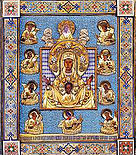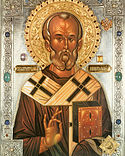Resolution of the Clergy of the St. Petersburg and Northern Russia Diocese
Resolution of the Clergy of the St. Petersburg and Northern Russian Dioceses
“…and the sheep listen to his voice.
He calls his own sheep by name and leads them out…
When he has brought out all his own, he goes on ahead of them,
and his sheep follow him because they know his voice.”
John 10:3,4
“But they will never follow a stranger; in fact, they will run away from him,
because they do not recognize a stranger’s voice.”
John 10:5
We are thankful to God and our Savior Lord Jesus Christ, who pours out life-giving mercy on His Holy Church! Truly the Good Shepherd, “calls his own sheep by name.” “That is the nature of the Shepherd, showing his deep concern for each one of his sheep. He would not have called them by name, if after all his toil, he would not know each of them individually.” This is what the Holy Church tells us in the words of the Greek theologian of the 12 century Euthymius Zigabenom. The Savior provides the example and “goes on ahead of them,” His wards and herd, “leading them on the straight path and protecting them,” He Himself fulfilling that which He teaches to others.
We, the clergy of the St. Petersburg and Northern Russian Diocese, only want, as Chrysostomos said, “to play our pipe to the herd”; that is to confess the word of God, serve as pastors and lead the souls of the faithful to eternal salvation. “But when the wolf appears,” the saint continues, “one must take up his sling.” The wolf is a danger and a threat to Christ’s herd. We now raise our voices in defense of the parishes entrusted to us from the “stranger’s voice,” the destructive actions and decisions of Metropolitan Agafangel (Pashkovskiy) and the Synod he heads. In this we agree with the majority of ROCA clergy in Russia, Europe, North America, South America and Australia, who did not accept union in 2007. Recent events present a choice to us, either follow the path of pastoral care and full sobornost, exemplified by the ROCA historically, or close our eyes to the administrative lawlessness, which resembles many of the representatives of the Moscow Patriarchia or uncanonical catacomb groups.
Indeed, since when is such behavior acceptable in the Church, to quickly rid it of “problem” people who pose “uncomfortable” questions; people who are actually trying to stop the damage of wrong decisions. This is how the administrative machine of Met. Agafangel punishes and censures without the necessary objective investigation, without the necessary judicial procedure.
As an example, the treatment of Bishops Dionisiy and Iriney is appalling; “…let’s censure them first, and then go there to talk with them.” (Met. Agafangel, minutes from November 12\25, 2016.) Much dissatisfaction also resulted from the establishment of dual power in the North American diocese (minutes from April 15\28, 2016). They assured B. Andronik that it is for the good of the diocese, and believing this, he adds his signature to the decision, but quickly realizes he has been tricked and removes the signature.
Another reason for the unrest is the incursion into the St. Petersburg diocese by accepting the parish in Dudachkino. The false explanation is offered, that Fr. Aleksandr Sukhov left the diocese of his own free will, because of the so-called, “heretical and schismatic” meeting in Naverezhiye, which has little to do with reality. For some reason, no one in the Odessa Synod was concerned that Fr. Aleksandr had stopped taking part in the life of the diocese for some time now and in five years had attended only one diocesan meeting. Fr. Aleksandr did not listen, despite the numerous words of advice and explanations provided by the ruling bishop, Abp. Sophroniy. No one in the Odessa Synod was very troubled by the unhealthy nature of church life in the Dudachkino parish. For example, on the ikonostasis of the church in Dudachkino is a depiction of Rasputin with a halo holding Holy Martyr Tsarevich Aleksey in his arms, which Bishop Gregory of Sao Paulo and South America called blasphemy.
The troubles in the Holy Trinity parish in Astoria and the rushed, unlawful punishments issued by the July Synod have destroyed the authority and trust in Met. Agafangel and his Synod to such an extent, that we are compelled to adopt extreme measures to protect our parishes. This Synod does not simply make mistakes, it rushes to make them, approving clearly contradicting decisions. Thankfully, our brothers in the Greek Church took an active role in helping the situation.
Archbishop Kallinikos personally called Met. Agafangel on the eve of the July Synod and asked to not make any rash decisions or disciplinary actions. He is assured that nothing of the sort will be done. At the same time, Met. Agafangel posts on his page in Facebook, “Only Love can be higher than the Law, only Mercy can be higher than Right, and only Forgiveness can be higher than Fairness…and may such a life become the rule for us.” But instead, the July Synod approves decisions that dumbfound our Greek brothers, while we are “cuffed on the head,” as Protodeacon German Ivanov-Trinadzaty of Lyon put it.
God sees that we do not wish to participate in a “concert of blaming each other,” as St. Basil the Great calls family conflicts. We are thankful to God that since 1990 we were able to experience the true Russian Orthodox Church Abroad under Met. Vitaliy (Ustinov) and the many venerable bishops, pastors, and Brother Joseph and the wonderous Iveron icon of the Mother of God. We understood this voice of Christ. We now have something to compare with and that is why this stranger’s voice is completely unacceptable to us, or more precisely, the sound of the current Odessa Synod from which, as the Gospel tells us, one wants to run away from, to escape this imitation of the religious foundation of the ROCA. Do the members of this Synod not understand that seeing such “administration,” that no sound thinking person in the church would want to join them?
Therefore, to protect and shield our parishes from the unacceptable actions of Met. Agafangel and his Synod, we consider it our pastoral duty to declare:
1. We do not recognize the “punishments” of the Odessa Synod in July, 2016, in regard to Archbishop Andronik and Archbishop Sophroniy. We continue to consider Archbishop Sophroniy our ruling bishop.
2. Each rector can decide whether to commemorate Met. Agafangel during the Litany of Fervent Supplication or a moleben as the ailing Metropolitan Agafangel.
3. We consider the calling for an All-Diaspora Council* a necessary step to resolve the crisis in the Church, and which will allow a conciliar judgment of the actions of Met. Agafangel and his Synod and lead to relieve the situation.
4. We pray that reason and peace be restored in the Church and hope that our oneness in Christ will be restored by returning to the foundational spiritual basis of the ROCA.
In closing we remind everyone that the doors to repentance are open to all, and instead of constantly being preoccupied with convincing yourself of various things and applying pressure to put down “uprisings” that threaten unrest in the Church, it would be far better to use the time to rescind all the dictatorial punishments and ask forgiveness for the mistakes committed.
+Sophroniy
Archbishop of St. Petersburg and Northern Russia
Hegumen Pakhomiy (Papazov)
Hieromonk Ignatiy (Krutkov)
Hieromonk Sergey (Pereskokov)
Hieromonk Savvatiy (Shvashtein)
Hieromonk Zosima (Kuzmin)
Hierodeacon Pavel (Lipin)
Archpriest Sergey Platunov
Fr. Igor Dubrov
Fr. Aleksandr Richagov
Fr. Oleg Orlov
Deacon Viktor Zavodov
Deacon Aleksey Badanov
Parish of Holy New Martyr Grand Duchess Elizabeth, Augsburg, Germany
August 17\30, 2016
* There are some that say that convening an All-Diaspora Council without allowing Met. Agafangel to participate in its preparation contradicts the Status of the ROCA, and that a Council does not serve as a judicial body. Allow us to ask, does the Status of the ROCA allow an election of a metropolitan at an All-Diaspora Council? The answer is obvious, it does not. Yet Met. Agafangel allowed that, and he was right to do so. Further, if the primary reason for the unrest is the loss of sobornost in the Church, what better way to restore it than convening a council, which would be free from the abuse of power exercised by Met. Agafangel and his Synod? If the Metropolitan needed the conciliar voice of the Church to be chosen for his position, then a council has the right to call the Metropolitan to account for his actions.

